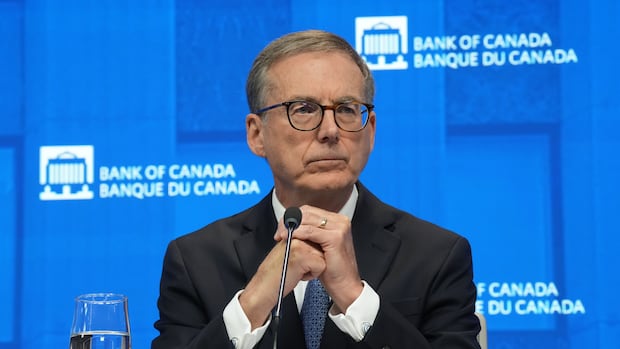Bank of Canada lowers interest rate to 2.5% in first cut since March
The Bank of Canada lowered its key interest rate by 25 basis points to 2.5 per cent on Wednesday, marking its first cut since March, as the central bank moves to stimulate a weakened economy.
The job market has softened, inflation excluding gas has eased, and the federal government's removal of retaliatory tariffs against the U.S. has reduced some "upside risk" to future inflation, governor Tiff Macklem noted in his opening remarks during a news conference in Ottawa.
"Considerable uncertainty remains. But with a weaker economy and less upside risk to inflation, Governing Council judged that a reduction in the policy rate was appropriate to better balance the risks going forward," he said.

The economy has seen a number of developments since July that influenced the bank's unanimous decision to cut rates, Macklem explained. But the U.S. trade war is still playing a significant role in the country's overall economic outlook.
"The Canadian economy is being affected by both U.S. tariffs and the unpredictability of U.S. trade policy," Macklem said.
A snapshot of the Canadian economyGDP declined in the second quarter, as the central bank expected, and exports to the U.S. fell after businesses initially front-loaded on inventory in response to U.S. tariffs. Some businesses have pulled back on their investments.
Tariffs continue to have a "profound effect" on key Canadian industries such as auto, steel and aluminum — as do additional tariffs on copper and lumber and Chinese tariffs on canola, pork and seafood, Macklem said.
Meanwhile, the Canadian economy has lost more than 100,000 jobs in the last two months and the unemployment rate has climbed to 7.1 per cent.
In addition to significant job losses in tariff-exposed sectors, employers in other industries are pulling back on hiring as uncertainty plagues the Canadian economy, Macklem explained.
Consumer spending was stronger than expected in the second quarter, but that could change as job market weakness weighs on Canadian households, he added.
However, "we're not expecting a recession" if the U.S. maintains its current tariff policy toward Canada, Macklem told reporters. He cautioned that would change if the tariff regime escalated.
"Looking forward, we have seen more stability in U.S. tariffs since July, and in that sense, at least some of the near-term tariff uncertainty has declined," he said. As such, the bank isn't being as forward-looking as it usually is.
While the overall inflation rate stands at 1.9 per cent, the Bank of Canada pays close attention to core measures of inflation, which exclude volatile sectors like gas from the overall rate.
The bank's inflation sweet spot is two per cent, with a target range between one and three per cent. Core measures have hovered closer to the higher end of that range, but the pace of their growth has eased in recent months, Macklem noted.
"There is some more comfort that some of those upward pressures we saw on underlying inflation are coming off," noted Macklem during a Q+A with reporters.
Inflationary pressures seem "a little more contained," he said, but weak economic growth tipped the balance in cutting the interest rate on Wednesday. "We don't want Canadians to have to worry about big increases in the cost of living."
The Bank of Canada will make its next interest rate decision on Oct. 29.
cbc.ca





